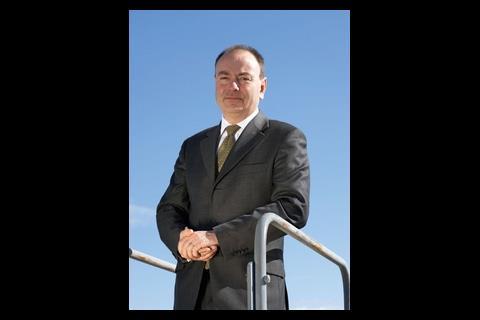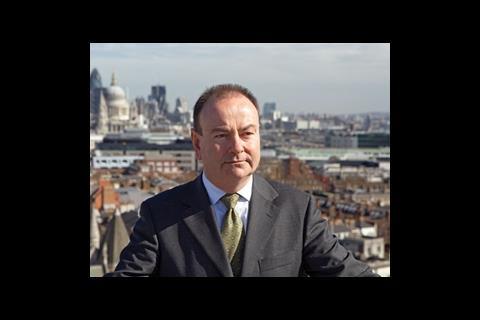Andy Pearson meets the man who wants to make industry cut carbon emissions by two-thirds
In the construction industry, no one is a stranger to stressful work targets, be they unrealistic deadlines or attempting to make a glass-fronted monolith a shining example of low-energy services design. But Tom Delay arguably has a more daunting work objective than most. As chief executive of the Carbon Trust, which has now been operating for five years, he is charged with trying to tackle climate change by making a dent in the UK’s woefully high production of carbon emissions.
The country gives out no less than 176 million tonnes of carbon a year, according to Delay, and his mission is to work towards cutting that figure by 60%.
Clarifying the statistics, Delay explains: “According to some figures, the UK emits 164 million tonnes of carbon a year. But to be more accurate you have to think of it in terms of consumption. We actually ‘consume’ 176 million tonnes of carbon because some of the production gets exported and some imported. And the UK is a net importer by about 12 million tonnes.”
The Carbon Trust is a private company that was set up by the government to invest in carbon-cutting initiatives. It was established after business demanded that revenue from chancellor Gordon Brown’s Climate Change Levy was reinvested in low-energy schemes to ensure the tax was revenue neutral. Delay has been at its helm since the outset.
He describes the trust’s management as “private sector”. By this he means the trust has members instead of shareholders, so Delay cannot benefit from any shareholding, instead the Trust must reinvest any profit it makes from its activities and venture capital investments as a result of spending its £100 million budget.
To make Delay’s job more complicated still, the trust’s sights are not set on putting across the message of carbon reduction to a sympathetic public, rather to the traditionally morally nebulous world of industry and business. That said, the best way to have an impact on business, may be to target its consumers. At least that is the thinking behind the trust’s latest initiative intended to help stimulate a low-carbon economy. “We are at a tipping point: most consumers acknowledge climate change; they know it is real; they want to do something but they are not quite sure what,” Delay says. To help inform them the trust is about to launch a carbon label that will state a product’s carbon footprint in grams of carbon. “Everything has a level of embodied carbon in it and we are doing a lot of work looking at the point where consumers make a decision between similar products based on environmental impact.”
The label will also allow those businesses that have reduced the environmental impact of their products to crow about their achievements.
However, most of the schemes that the Trust puts into action target businesses more directly. Its five key initiatives (see box) range from explaining the likely impact of climate change, to funding carbon-reducing technologies.
So what made Delay the man for this job? He started his professional career working for oil company Shell, initially as a mechanical engineer before moving into general management. Despite the obvious differences between working for an oil giant and a government-funded environmental trust, his 16 years at the company allowed him to gain substantial experience working with businesses. This, he says, was useful because the Carbon Trust deals with businesses as opposed to, for instance, the Energy Saving Trust – also a government-funded organisation.
Most consumers want to do something about climate change, but they’re not sure what
Delay also alludes to working “where business and community come together”. He reveals that he was involved in distributing aid as part of the original Live Aid event. At that time he was Shell operations manager in Djibouti, east Africa. His task for Live Aid was to get oil supplies into Ethiopia, including road tankers into the famine-stricken areas to allow the RAF Hercules transporters to refuel for their return flight. “It was an exciting time, there were no roads at the time and the tankers were too big to fit into an aircraft,” he explains.
In the end he turned to the sea. He diverted a Shell oil tanker into the port of Djibouti and the road tanker was strapped to its deck, from where it was taken up the coast to a point where there was a road into the famine-stricken areas. “I don’t want to think about the number of regulations we must have broken,” he says.
Looking back, the two-year drought that exacerbated the effects of war in Ethiopia was an obvious example of the destructive forces of climate change, but Delay says that 20 years ago, when he worked for Shell, climate change was not a mainstream issue. “At Shell I never once worried about the environmental impact or energy performance of what I was doing.”
After leaving Shell, Delay worked as a management consultant.
Delay’s conversion from oil and management consultancy to corporate environmentalist makes him the perfect man to convince a sceptical industry of the merits of turning green. Did he take the job for philanthropic reasons? “It was a great opportunity to tie my professional skills to my personal beliefs,” he says.
It’s hardly the response of an impassioned eco-warrior. But in his role, Delay needs to be someone who can speak the same language as business people and politicians. He says the organisation does not lobby, nor does it make government policy. But it still carries significant influence with government by presenting it with evidence about the success of its initiatives. It’s also important for him to have good business acumen to ensure the trust’s budget is used sensibly.
But does he really believe the UK will reach the 60% reduction in carbon the government has called for? “I think we will,” he says, tentatively. “If we don’t it will be through our own lack of will, because it certainly won’t be through not having the available technology.”
The trust has worked with CIBSE and other professional organisations to spread the word – last year it helped fund CIBSE’s 100 Days of Carbon Clean Up campaign. So when it comes to bringing about a change of attitude in the construction industry at least, Delay seems more certain. “I think there is a real opportunity for us to be collaborative and to partner with other professional bodies to provide us with a channel to market,” he says. “And, equally, they can help provide us with an input to our own thinking.”
Source
Building Sustainable Design






















No comments yet